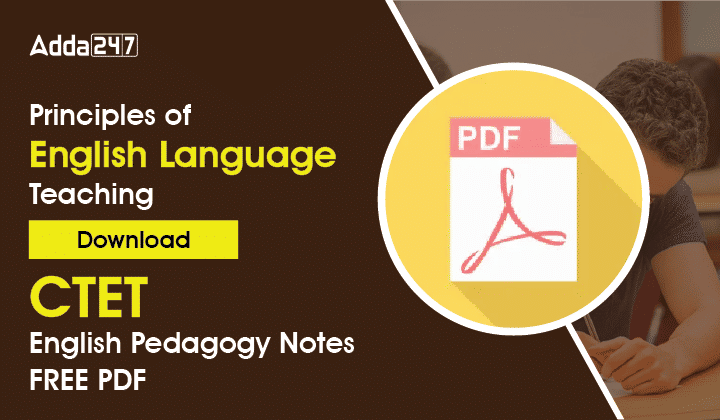Table of Contents
In many teaching exams including CTET and other State TETs, etc., English is a pertinent subject with significant weightage of marks. Candidates preparing for such Government Teaching Exams have to attempt 15 questions of English content and 15 questions of English Pedagogy in Exams. In English Pedagogy is one of the interesting and scoring topics under the English Language sections of teaching exams. In this article, we are providing you few topics of English pedagogy.
Principle of English Language Teaching
Language: is a medium through which one can express one’s ideas, thoughts, feelings etc. Different languages are spoken in the world.
• It is very difficult to ascertain how these languages originated. It is believed that people started conveying messages through signals, postures, gestures etc.
• Language is a human system of communication that uses arbitrary signals such as voice, sounds, gestures and written symbols.
• According to Edward Sapir, “Language is a purely human and non – instinctive method of communicating ideas, • emotions and desires by means of a system of voluntarily produced symbols”.
(A) Characteristics of a Language
- Language is a Vital Part of Growth Process: It is a social act, a means of adjustment to control over other people, Language exists in a society, it is a means of nourishing and developing culture and establishing human relations.
- Language is Symbolic: Language consists of various symbols that are employed to denote some objects, occurrences or meaning.
- Language is Systematic: Although language is symbolic, its symbols are arranged in a particular system. All languages have phonological and grammatical systems and within a system, there are several subsystems.
- Language is Arbitrary: There is no inherent relation between the words of a language and their meaning or the ideas conveyed by them.
- Language is Productive and Creative: The structural elements of human language can be combined to produce new utterances, never heard before according to the needs of a society.
(B) Aims of Language Teaching
- Ability to understand the speaker’s language.
- Ability to read along with understanding.
- Ability to express fluently and diversely using different skills.
- Ability to present or write view in a coherent manner.
- Ability to learn technological language used in teaching other subjects such as music, computers or sports etc.
- Ability to understand the scientific aspect of a language.
- Development of creative skills.
- Development of a learner’s sensitivity towards national issues, cultural heritage and different aspects of contemporary life.
(C) Importance of Language
- Language is our primary source of communication. It is the method through which we share our ideas and thoughts with others.
- The three phases of human knowledge preservation, transmission and advancement are possible only with the help of a language.
- Language is also the best source of social and cultural development.
(D) Importance of English Language
Study and using of the English language is important in India as it is the most common foreign language. Everyone needs to learn the language in order to get in touch on an international level.
According to the University Grants Commission (UGC),
English is a language which is rich in literature – humanistic, scientific and technical. It under sentimental urges, it should give up the English language, we would cut ourselves off from the living stream of ever-growing knowledge”.
- Some more reasons for its importance are as follows
- English is also the primary language of the press and the internet. More books and newspapers are written in English than in any other language.
- English is the only language where maximum resources are available which makes it easier to learn.
- English, being an international language, makes travel and business convenient for others.
- In India, English is regarded as the second language so its importance cannot be undermined.
(E) Principles of Language Teaching
- Theory of Motivation and Interest: Motivation is an important factor in language learning particularly in learning a second language. English resources and textbooks should be selected according to the interests and aptitudes of students. The teacher can arouse pupils’ interest in a number of ways and language learning can be made increasingly interesting. It can be done with the help of charts, pictures, flashcards, models, blackboard sketches and other similar visual devices.
- Theory of Imitation: According to many psychologists, the child learns a language through imitation. Good speech is the result of imitating good pronunciation and vocabulary. Imitation followed by intensive practice helps in the mastery of the language system.
- Theory of Habit Formation: ‘Language learning’ according to Palmer, “is essentially habit forming process, a process during which we acquire new habits”. Teachers can make language patterns a habit through intensive pattern practice in a variety of situations. In language learning habits of speech, listening, reading, writing, and correct pronunciation should be formed.
- Theory of Exercise (Practice and Drill): According to BF Skinner, psychological experiments have proved that practising and drilling play an important part in language teaching. Teachers should make sure that repetitions of things at proper intervals should be done.
- Theory of Individual Differences: Every child is unique and different from others. In language teaching, we have to keep in mind that learners possess different abilities, and personalities and belong to different backgrounds. So, the stimulus needs of every learner will be different. Teaching has to be done keeping in mind the individual differences and problems arising out of it. The teachers should adopt different tacts, strategies and multiple approaches to make learning meaningful.
- Theory of Using Mother: The mother tongue should be sparingly and judiciously used while teaching English. Of course, at an early stage, some explanations will have to be given in pupils’ mother tongue but at later stages, inputs from the targeted language in a simple graded manner can help in minimizing the influence of the mother tongue.
- Correlation with Life: English should be practised in everyday situations with which children can easily identify. This way meaning will be clarified and reinforced.
- Theory of Oral Approach: Speech motivates the learners to learn. Speech must precede reading and writing. Introduction to lessons should begin orally as learning to speak a language is always the shortest way to learn to read and write it.
- Theory of Selection and Gradation: Items of learning should be presented according to the order of ease. It should not be too rigid grading. There should be structural and vocabulary grading. Essential vocabulary and basic structures of a language should be taught first.
(F) Maxims Used while Teaching English Language
- Known to the Unknown: Teaching should be carried on what the students know either in their native language or in English. It is considered that old knowledge lays the foundation of new knowledge. e.g. pronouns in English grammar should be taught when the learner has a knowledge of nouns.
- Simple to Complex: Simple things and vocabulary should be taught first before proceeding to complex structures or vocabulary items. By learning simple things learners feel motivated and confident which would certainly help in better understanding of complex things.
- Concrete to Abstract: Concrete things are real things which can be seen and felt by our senses. Abstract things can be just imagined. Teaching done with the help of concrete objects lasts for a longer period e.g. a learner can imagine a golden apple only if he has seen an apple.
- Analysis to Synthesis: When teaching is done from detailed teaching to summarizing we go from analysis to synthesis e.g. if a learner is taught different tenses with examples, he is able to understand sentence structures easily.
- Induction to Deduction: in the induction method, we give some examples first then try to reach on a conclusion. In deduction, first of all, a rule is explained then some examples are given. Teaching should always precede from induction to deduction. Examples speak louder than language explanation. Such examples can help students learn much better complicated concepts.
- Psychological to Logical: While teaching, the interests, aptitudes, capacities and difficulty level of the learners should be kept in mind. e.g. vocabulary and sentence structure of a language should be taught keeping in mind the difficulty level of the learners and then they could be arranged and explained in a logical manner.
- Relate form to Meaning and Contextualize: All class activities should be meaningful, whatever activity the students are involved in, the students should be able to understand the meaning of what they hear, say, read or write. Teach new vocabulary items in context.




 समुद्र का पर्य�...
समुद्र का पर्य�...
 उपमा अलंकार: पर�...
उपमा अलंकार: पर�...
 समास परिभाषा, भ�...
समास परिभाषा, भ�...














